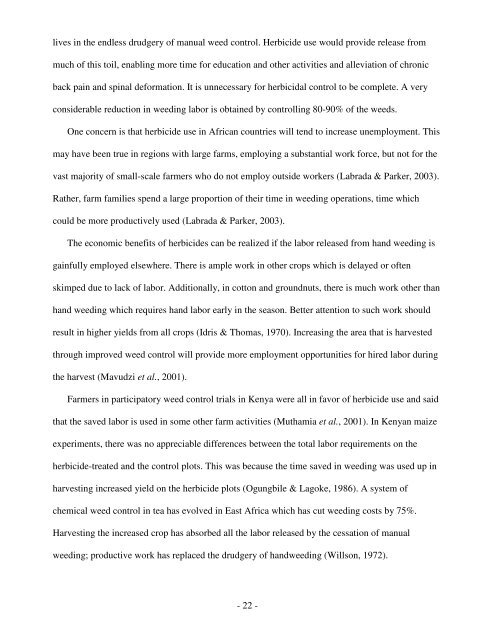solving-africas-weed-problem-report1
solving-africas-weed-problem-report1
solving-africas-weed-problem-report1
Create successful ePaper yourself
Turn your PDF publications into a flip-book with our unique Google optimized e-Paper software.
lives in the endless drudgery of manual <strong>weed</strong> control. Herbicide use would provide release from<br />
much of this toil, enabling more time for education and other activities and alleviation of chronic<br />
back pain and spinal deformation. It is unnecessary for herbicidal control to be complete. A very<br />
considerable reduction in <strong>weed</strong>ing labor is obtained by controlling 80-90% of the <strong>weed</strong>s.<br />
One concern is that herbicide use in African countries will tend to increase unemployment. This<br />
may have been true in regions with large farms, employing a substantial work force, but not for the<br />
vast majority of small-scale farmers who do not employ outside workers (Labrada & Parker, 2003).<br />
Rather, farm families spend a large proportion of their time in <strong>weed</strong>ing operations, time which<br />
could be more productively used (Labrada & Parker, 2003).<br />
The economic benefits of herbicides can be realized if the labor released from hand <strong>weed</strong>ing is<br />
gainfully employed elsewhere. There is ample work in other crops which is delayed or often<br />
skimped due to lack of labor. Additionally, in cotton and groundnuts, there is much work other than<br />
hand <strong>weed</strong>ing which requires hand labor early in the season. Better attention to such work should<br />
result in higher yields from all crops (Idris & Thomas, 1970). Increasing the area that is harvested<br />
through improved <strong>weed</strong> control will provide more employment opportunities for hired labor during<br />
the harvest (Mavudzi et al., 2001).<br />
Farmers in participatory <strong>weed</strong> control trials in Kenya were all in favor of herbicide use and said<br />
that the saved labor is used in some other farm activities (Muthamia et al., 2001). In Kenyan maize<br />
experiments, there was no appreciable differences between the total labor requirements on the<br />
herbicide-treated and the control plots. This was because the time saved in <strong>weed</strong>ing was used up in<br />
harvesting increased yield on the herbicide plots (Ogungbile & Lagoke, 1986). A system of<br />
chemical <strong>weed</strong> control in tea has evolved in East Africa which has cut <strong>weed</strong>ing costs by 75%.<br />
Harvesting the increased crop has absorbed all the labor released by the cessation of manual<br />
<strong>weed</strong>ing; productive work has replaced the drudgery of hand<strong>weed</strong>ing (Willson, 1972).<br />
- 22 -


